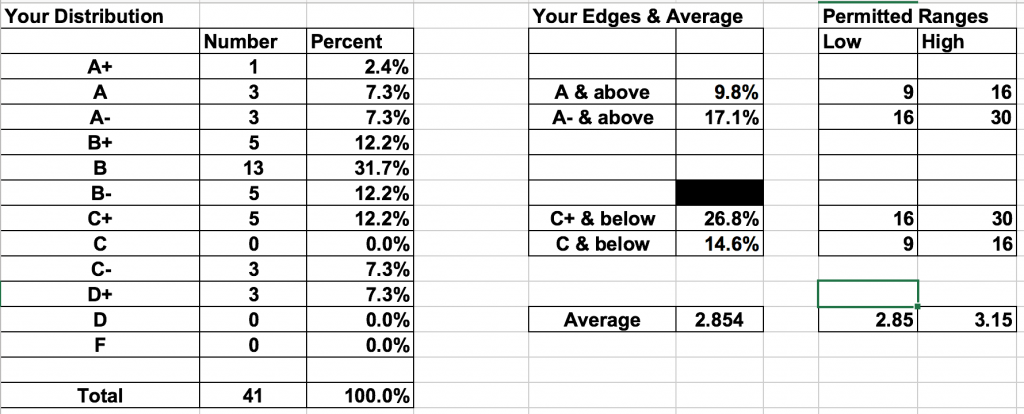I have finished grading your ConLaw midterms. You can download the exam here, and the A+ paper here.
The papers were frankly disappointing. First, many of you lacked an awareness that the case arose in 1862, and cited precedents from after that date. We discussed this dynamic in class–there is no reason why Youngstown or other 20th-century separation of powers cases. Second, while I appreciated that only a handful of students wrote over 1,000 words, the vast majority of papers were less than 700 words; some were less than 500. I suspect time was a crunch, which prevented students from developing more thorough analyses. We can work on this, but you can’t earn a high grade with such thrifty answers. Third, many students simply misread the prompt, and answered questions I didn’t ask. There is a lot of room for improvement, which is why we hold this midterm at the half-way point of the semester: there is time to correct errors.
Here is the distribution:

Here are some general thoughts on the questions.
- The first question concerned Frederick’s challenge brought under the Federal Emancipation Act with diversity jurisdiction. This case contained two parts. First, was Frederick (a slave) a citizen of Georgia? Under Dred Scott the answer was no. Several of you discussed Lincoln’s approach to Dred Scott, which limited the case to the two parties. Others suggested that Congress can and should reject Dred Scott. The second part concerned whether Ashley a citizen of any state? He was no doubt a citizen of Virginia, but at the time, was Virginia a state within the United States? This was an opportunity for you to discuss whether the southern states actually seceded (as the Confederate States of America contended), or whether they were merely in rebellion (as Lincoln contended). Many of you started to discuss the constitutionality of the Federal Emancipation Act in Question one, even though that was the subject of Question two. Don’t do this. If you find yourself repeating an answer, that means you misread the question. Each question is directed at a specific issue, and there should not be overlap.
- The constitutionality of the Federal Emancipation Act should be assessed in the similar fashion that we assessed the constitutionality of the Emancipation Proclamation, but with several twists. First, you should have discussed whether the statute was consistent with Dred Scott, which ruled that all people of African descent could never be citizens. Second, you should have discussed whether Congress’s commerce powers supported the statute. Remember, in 1861, Wickard had not yet been decided. Thus, notwithstanding the way I framed the question, the phrase “substantial effects” had no place in caselaw. You should have cited Gibbons v. Ogden, which was one of the early commerce clause cases. Third, you could have also cited Prigg v. Pennsylvania, concerning Congress’s power over slavery, as well as McCulloch’s discussion of the Necessary and Proper power. Fourth, you should have discussed whether the President’s wartime power allows him to seize property (that is, the slaves), as Lincoln contended. Fifth, you should have discussed whether this statute ran afoul of the Takings Clause of the Fifth Amendment, as no compensation was provided.
- The third question was an application of Chisholm v. Georgia: could a citizen of Maryland sue the state of Maryland without its consent? Nothing in the text of the 11th Amendment would prohibit such a suit. Hans v. Louisiana would not be decided for another four decades. (If you cited Hans as binding precedent, that was wrong). Therefore, you would have to parse the various opinions in Chisholm, and whether the notion of sovereign immunity was required by the Constitution. Again, this question only concerned jurisdiction; if you discussed whether the Maryland Emancipation Act was constitutional in this part, you gained no points.
- The fourth question concerned whether the state’s police power included the authority to eradicate slavery. Many of you wrote that the state statute would violate the 5th Amendment’s takings clause. But before the 14th Amendment, Barron v. Baltimore was still good law. After all, Barron specifically held that the Takings did not apply to Maryland! Dred Scott did a lot of things, but it did not question a state’s ability to eliminate slavery (it did question whether the freedmen could be made citizens).
- The last question–the policy question–was a takeoff of Ex Parte Merryman. What should the courts do when they know their decision will not be enforced? At a minimum, you should have compared the facts of this case to Merryman, which was decided in 1861. Many of you also talked about Marbury v. Madison, where Marshall understood that Jefferson would not comply with an adverse ruling. Also, you should have referenced Hamilton in Federalist No. 78, wherein the courts were the “least dangerous branch,” with neither the power of the sword nor of the purse. Many students have very, very short answers for the last part, which tells me you ran out of time.
I look forward to meeting with each of you to discuss these exams.